
CATHERINE RAMPELL
Dollars to doughnuts.
The average annual number of times Americans visit medical providers has been falling over the last decade, according to a new report from the Census Bureau. But their overall spending on health care is still rising.
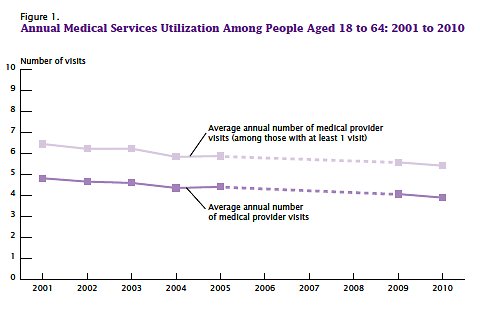 Note: Data on medical services utilization are not available in the SIPP for 2006, 2007, and 2008. Source: U.S. Census Bureau, Survey of Income and Program Participation, 2001 Panel, waves 3, 6, and 9; 2004 Panel, waves 3 and 6; and 2008 Panel, waves 4 and 7. Chart from “Health Status, Health Insurance, and Medical Services Utilization: 2010,” by Brett O’Hara and Kyle Caswell.
Note: Data on medical services utilization are not available in the SIPP for 2006, 2007, and 2008. Source: U.S. Census Bureau, Survey of Income and Program Participation, 2001 Panel, waves 3, 6, and 9; 2004 Panel, waves 3 and 6; and 2008 Panel, waves 4 and 7. Chart from “Health Status, Health Insurance, and Medical Services Utilization: 2010,” by Brett O’Hara and Kyle Caswell.
Among Americans 18 to 64 years old, the average person visited medical providers 3.9 times in 2010, compared to 4.8 times in 2001.
Both healthy Americans and less healthy Americans reported going to the doctor less frequently in 2010 than they did in 2001:
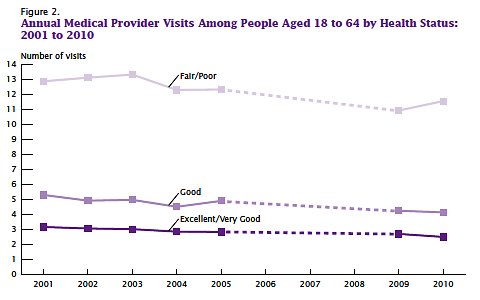 Note: Data on medical services utilization are not available in the SIPP for 2006, 2007, and 2008. Source: U.S. Census Bureau, Survey of Income and Program Participation, 2001 Panel, waves 3, 6, and 9; 2004 Panel, waves 3 and 6; and 2008 Panel, waves 4 and 7. Chart from “Health Status, Health Insurance, and Medical Services Utilization: 2010,” by Brett O’Hara and Kyle Caswell.
Note: Data on medical services utilization are not available in the SIPP for 2006, 2007, and 2008. Source: U.S. Census Bureau, Survey of Income and Program Participation, 2001 Panel, waves 3, 6, and 9; 2004 Panel, waves 3 and 6; and 2008 Panel, waves 4 and 7. Chart from “Health Status, Health Insurance, and Medical Services Utilization: 2010,” by Brett O’Hara and Kyle Caswell.
Visits to the doctor and other medical providers may be falling, but health spending is still substantially higher today than it was a decade ago, according to the Labor Department’s Consumer Expenditure Survey.
The typical household (including residents of all ages) spent $3,313 on health care in 2011, compared to $2,771 in 2001, after adjusting for inflation.
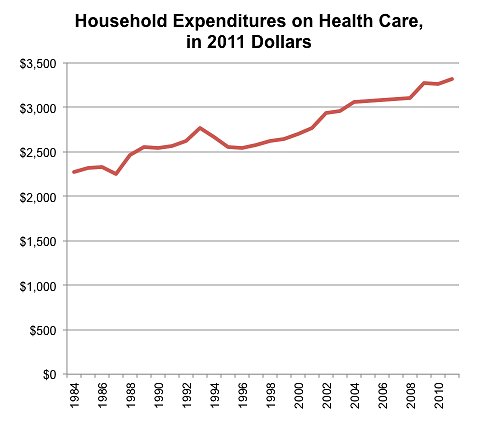 Sources: Consumer Expenditures Survey, Consumer Price Index.
Sources: Consumer Expenditures Survey, Consumer Price Index.
Health care spending has generally been rising even as total household spending has stagnated or fallen in recent years. As a result, health care spending is eating up a larger share of total household budgets than it used to. As of 2011, the typical American household spent 6.7 percent of its total expenditures on health care.
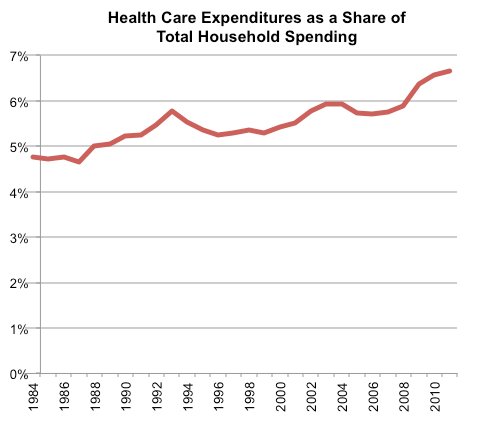 Source: Consumer Expenditure Survey.
Source: Consumer Expenditure Survey.
Almost every category of health care spending has been rising.
The average American household spent $768 on medical services last year, an increase of 3.1 percent from the year before. It also spent $1,922 on health insurance, an increase of 1.8 percent from the year before; and $134 on medical supplies, up 9.2 percent from the year before.
Annual household spending on prescription and nonprescription drugs fell 2.3 percent, however, to $489.
Spending growth on health insurance is slower than that for some other health care categories, but the base was so large to begin with that health insurance is accounting for a growing percentage of the typical household’s total health care spending. In other words, a bigger share of households’ health care spending is going through insurance companies as opposed to coming from co-payments and other out-of-pocket spending.
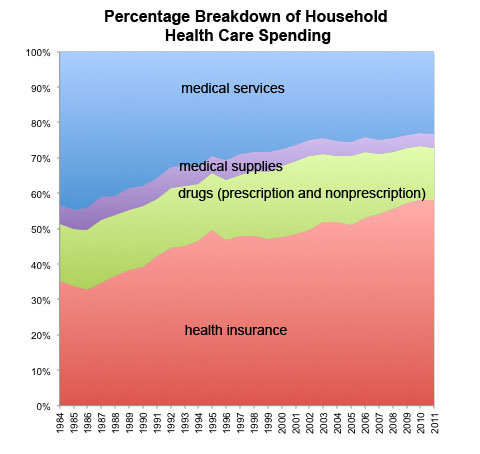 Source: Consumer Expenditure Survey.
Source: Consumer Expenditure Survey.
Article source: http://economix.blogs.nytimes.com/2012/10/01/visiting-the-doctor-less-but-spending-more-on-health/?partner=rss&emc=rss
Speak Your Mind
You must be logged in to post a comment.